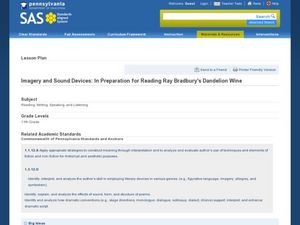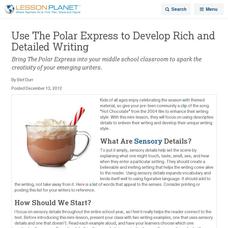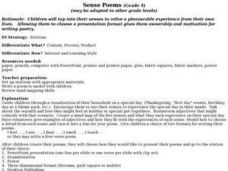Curated OER
Using Descriptive Language
Students explore the technique of descriptive writing. As a class, they observe a poster and describe it using adjectives. They discuss how descriptive words can be used literally and figuratively in the world of advertising. After...
Curated OER
Voyage
Students listen to N.C, Wyeth's Pilgrims and discuss what the Mayflower looked like. In this Mayflower lesson, students use sensory words to describe what it was like on the Mayflower. Students illustrate their vision of the Mayflower.
Curated OER
Essential Elements of Habitat
First graders compare their local area with the Belize landscape. They construct maps of the school area, adding descriptive information. They write haiku poems about their favorite outside places.
Curated OER
Sense Poetry
Access your young poets' senses and emotions with this activity, which guides them through the process of writing a "sense poem." After working on a sense poem as a class and modeling the procedure, individuals work on their own poems...
Curated OER
Imagery and Sound Devices: In Preparation for Reading Ray Bradbury's Dandelion Wine
Twelfth graders analyze Ray Bradbury's use of techniques and elements of fiction as well as nonfiction in the novel Dandelion Wine. In this novel analysis lesson, 12th graders analyze the sensory techniques in Dandelion Wine. Students...
Houghton Mifflin Harcourt
Songwriting Skill - Elaboration: Jesse McCartney - “How Do You Sleep?”
The practice of developing lyrics by elaborating with sensory details and examples continues in the third lesson on songwriting. This time class members examine Jesse McCartney's "How Do You Sleep?" Using procedures established in the...
Curated OER
Use The Polar Express to Develop Rich and Detailed Writing
Bring The Polar Express into your middle school classroom to spark the creativity of your emerging writers.
Curated OER
How Do Authors Use Imagery to Shape Their Writing?
Esther Forbes' award-winning Revolutionary War novel, Johnny Tremain and excerpts from Julie Otsuka's When the Emperor Was Divine are used to model how imagery brings alive the setting of a story. The young writers then craft their own...
Curated OER
Grammar On The Go
Help your learners understand the parts of speech with this color-coding activity. While reading a short passage, readers circle the nouns with blue, the verbs with red, and the adjectives with green. When they are done, scholars list...
Teacher's Corner
Haiku
The haiku, one of the most popular fixed forms, is the subject of this writing activity, the seventh in a series of ten poetry exercises.
Curated OER
Standards Focus: Recognizing Vivid Details, Of Mice and Men
In this recognizing details worksheet, students read 3 excerpts from chapter 3 of John Steinbeck's Of Mice and Men, underlining each word that evokes some sensory stimulation (sight, sound, smell, touch, taste). Students also respond to...
Curated OER
How Does It Feel?
Students identify the textures of materials in their environments in order to expand their language, math, sensory, and observational skills. In this sensory activity lesson, students first write a list of different words to describe...
Curated OER
Flying Freudian Fun: A Look At Ethical Decision Making
There are not many more apt examples of ethics gone awry than William Golding's Lord of the Flies.. Ninth graders focus the ethics of decision making with the examples provided in the plot. They focus on the concept of the psyche and how...
Curated OER
Sense Poems
Students explore 5 senses poetry. In this poetry writing lesson, students visualize a special day and brainstorm related vivid adjectives and phrases. Students create mindmaps of the five senses to go with their visualization and write...
Curated OER
Locational Writing
Students go outside to the playground and write a piece in the style of beat poets based on what they see and hear outside.
Curated OER
Activity Plan Mixed Ages: Pineapple Investigations
Students use all of their senses to explore a fresh, delicious pineapple. In this early childhood lesson plan, students engage in activities that encourage sensory exploration, problem solving, creative-thinking, language skills, and the...
Curated OER
Reliving History Through Slave Narratives
Young scholars read slave narratives and retell the stories to the class, identifying sensory details. In this slavery lesson, students discuss the importance of sensory details, then read the slave narratives looking for specific...
Curated OER
My Favorite Room - Brainstorming Sheet
In this writing worksheet, students brainstorm a writing piece about their favorite room. They write a purpose sentence, and fill a chart that describes the room using the senses. They write a draft using the purpose sentence and three...
Curated OER
My Favorite Room
Young scholars practice describing a room. In this descriptive writing lesson plan, students use all of their five senses to describe their favorite room. The teacher will model for the class by creating a word list that describe the...
Curated OER
The Best Season - Fill In the Blank
In this seasons worksheet, students use 5 words from a word bank or their own words to complete a paragraph about the seasons. They write an original sentence about their favorite season on the lines below the paragraph.
Curated OER
Using Imagery in Poetry
Young scholars examine the use of imagery in poetry. In this literature lesson, students read "Thought of Hanoi," by Nguyen Thi Vinhand use the provided graphic organizer to chart the poem imagery. Young scholars then describe the...
Curated OER
Mouthwatering Adjectives!
Third graders write descriptions of food items in order to create a restaurant menu. They use adjectives to describe mouth-watering and vivid food and compare it to a boring adjective-lacking menu. They design and share their menus with...
Curated OER
Cloze Passage: Extra Senses
In this extra senses cloze procedure worksheet, students fill in the 12 missing words in the passage to help identify their reading level.
Curated OER
Reflecting/Writing after a field trip or other experience
Students reflect on field trips in writing. In this journal writing lesson, students write about a recent experience by using 4 of their senses to tell what they remember. They turn these into poetry.

























